Related Research Articles

David Paul Cronenberg is a Canadian film director and screenwriter. He is a principal originator of the body horror genre, with his films exploring visceral bodily transformation, infectious diseases, and the intertwining of the psychological, physical, and technological. Cronenberg is best known for exploring these themes through sci-fi horror films such as Shivers (1975), Scanners (1981), Videodrome (1983) and The Fly (1986), though he has also directed dramas, psychological thrillers and gangster films.

Naked Lunch is a 1991 surrealist science fiction drama film written and directed by David Cronenberg and starring Peter Weller, Judy Davis, Ian Holm, and Roy Scheider. It is an adaptation of William S. Burroughs's 1959 novel of the same name, and an international co-production of Canada, Britain, and Japan.
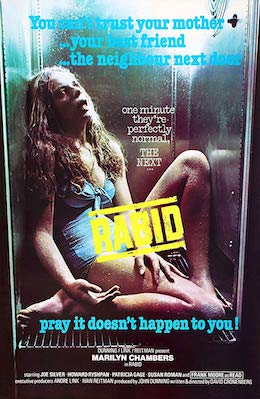
Rabid is a 1977 independent body horror film written and directed by David Cronenberg. An international co-production of Canada and the United States, the film stars Marilyn Chambers in the lead role, supported by Frank Moore, Joe Silver, and Howard Ryshpan. Chambers plays a woman who, after being injured in a motorcycle accident and undergoing a surgical operation, develops an orifice under one of her armpits that hides a phallic/clitoral stinger she uses to feed on people's blood. Those she bites become infected, and then feed upon others, spreading the disease exponentially. The result is massive chaos, starting in the Quebec countryside, and ending up in Montreal. Rabid made $1 million in Canada, making it one of the highest-grossing Canadian films of all time. A remake of the same name, directed by Jen and Sylvia Soska, was released in 2019.
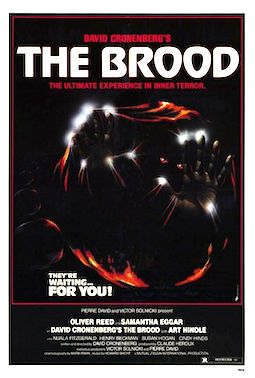
The Brood is a 1979 Canadian psychological body horror film written and directed by David Cronenberg and starring Oliver Reed, Samantha Eggar, and Art Hindle. Its plot follows a man and his mentally ill ex-wife, who has been sequestered by a psychiatrist known for his controversial therapy techniques. A series of brutal unsolved murders serves as the backdrop for the central narrative.
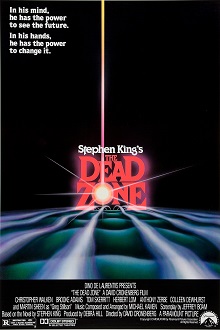
The Dead Zone is a 1983 American science-fiction thriller film directed by David Cronenberg. The screenplay, by Jeffrey Boam, is based on the 1979 novel of the same title by Stephen King. The film stars Christopher Walken, Brooke Adams, Tom Skerritt, Herbert Lom, Martin Sheen, Anthony Zerbe, and Colleen Dewhurst. Walken plays a schoolteacher, Johnny Smith, who awakens from a coma to find he has psychic powers. The film received positive reviews. The novel also inspired a television series of the same name in the early 2000s, starring Anthony Michael Hall, the pilot episode of which borrowed some ideas and changes used in the 1983 film.
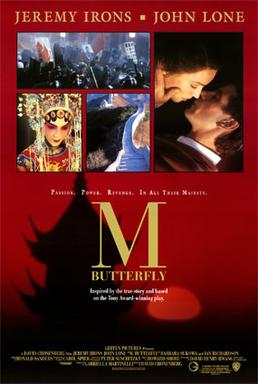
M. Butterfly is a 1993 American romantic drama film directed by David Cronenberg. The screenplay was written by David Henry Hwang based on his play of the same name. The film stars Jeremy Irons and John Lone, with Ian Richardson, Barbara Sukowa, and Annabel Leventon. The story is loosely based on true events which involved French diplomat Bernard Boursicot and Chinese opera singer Shi Pei Pu.
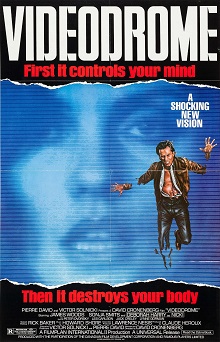
Videodrome is a 1983 Canadian science fiction body horror film written and directed by David Cronenberg and starring James Woods, Sonja Smits, and Debbie Harry. Set in Toronto during the early 1980s, it follows the CEO of a small UHF television station who stumbles upon a broadcast signal of snuff films. Layers of deception and mind-control conspiracy unfold as he attempts to uncover the signal's source, complicated by increasingly intense hallucinations that cause him to lose his grasp on reality.
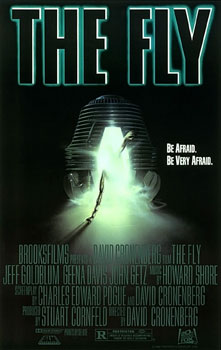
The Fly is a 1986 American science fiction horror film directed and co-written by David Cronenberg. Produced by Brooksfilms and distributed by 20th Century Fox, the film stars Jeff Goldblum, Geena Davis, and John Getz. Loosely based on George Langelaan's 1957 short story of the same name and the 1958 film of the same name, The Fly tells of an eccentric scientist who, after one of his experiments goes wrong, slowly turns into a fly-hybrid creature. The score was composed by Howard Shore and the make-up effects were created by Chris Walas, along with makeup artist Stephan Dupuis.
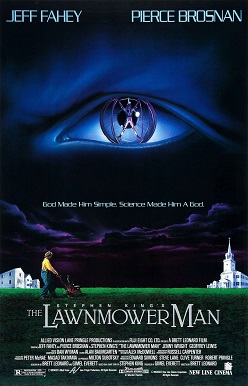
The Lawnmower Man is a 1992 science fiction horror film directed by Brett Leonard, written by Leonard and Gimel Everett, and starring Jeff Fahey as Jobe Smith, an intellectually disabled gardener, and Pierce Brosnan as Dr. Lawrence "Larry" Angelo, a scientist who decides to experiment on him in an effort to give him greater intelligence. The experiments give Jobe superhuman abilities, but also increase his aggression, turning him into a man obsessed with evolving into a digital being.
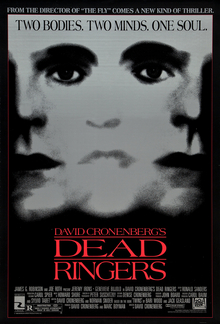
Dead Ringers is a 1988 psychological thriller film starring Jeremy Irons in a dual role as identical twin gynecologists. David Cronenberg directed and co-wrote the screenplay with Norman Snider. Their script was based on the lives of Stewart and Cyril Marcus and on the novel Twins by Bari Wood and Jack Geasland, a "highly fictionalized" version of the Marcuses' story.
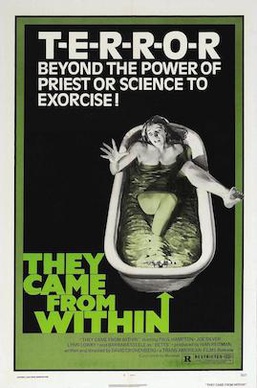
Shivers, also known as The Parasite Murders and They Came from Within, and, for Canadian distribution in French, Frissons, is a 1975 Canadian science fiction body horror film written and directed by David Cronenberg and starring Paul Hampton, Lynn Lowry, and Barbara Steele.
Timothy Ray Lucas is an American film critic, biographer, novelist, screenwriter and blogger, best known for publishing and editing the video review magazine Video Watchdog.

Crash is a 1996 Canadian drama film written, produced and directed by David Cronenberg, based on J. G. Ballard's 1973 novel of the same name. Starring James Spader, Deborah Kara Unger, Elias Koteas, Holly Hunter and Rosanna Arquette, it follows a film producer who, after surviving a car crash, becomes involved with a group of symphorophiliacs who are aroused by car crashes and tries to rekindle his sexual relationship with his wife.

Stereo is a 1969 Canadian science fiction film directed, written, produced, shot and edited by David Cronenberg in his feature film debut. Starring Ronald Mlodzik, who would go on to appear in later Cronenberg films Crimes of the Future, Shivers, and Rabid, the film was Cronenberg's first feature-length effort, following his two short films, Transfer (1966) and From the Drain (1967). The plot follows several young volunteers who participate in a parapsychological experiment.

Crimes of the Future is a 1970 Canadian science fiction film written, shot, edited and directed by David Cronenberg. Like Cronenberg's previous feature, Stereo, Crimes of the Future was shot silent with a commentary added afterwards, spoken by the character Adrian Tripod.

Fast Company is a 1979 Canadian action film directed by David Cronenberg and starring William Smith, John Saxon, Claudia Jennings and Nicholas Campbell. It was written by Phil Savath, Courtney Smith, Alan Treen and Cronenberg. It was primarily filmed at Edmonton International Speedway, in addition to other locations in Edmonton, Alberta, and Western Canada.
Camera is a 2000 Canadian short film written and directed by David Cronenberg. The six-minute short was one of several made for the special Preludes program in celebration of the 25th anniversary of the Toronto International Film Festival. These films, all by Canadian directors, were commissioned as preludes for the festival in 2000.
Transfer is a 1966 short film written, shot, produced, edited and directed by David Cronenberg. It features Mort Ritts and Rafe Macpherson and has a runtime of 7 minutes.
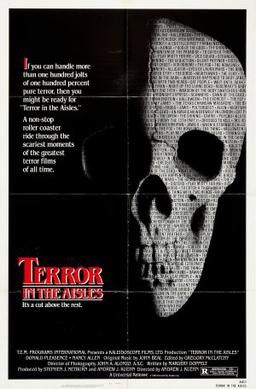
Terror in the Aisles is a 1984 American documentary film about horror films, including slasher films and crime thrillers. The film is directed by Andrew J. Kuehn, and hosted by Donald Pleasence and Nancy Allen. The original music score is composed by John Beal.

Six Men Getting Sick (Six Times) (sometimes known as Six Figures Getting Sick) is a 1967 experimental animated short film, directed by David Lynch. A student project that was developed over the course of a semester, it is Lynch's first film and was shot while he was attending the Pennsylvania Academy of the Fine Arts in Philadelphia, Pennsylvania. The film consists of an animated painting, depicting six dysmorphic figures regurgitating in sequence with the sound of a siren loop.
References
- ↑ Rodley 1997, p. 13.
- ↑ Broomer, Stephen (2016-01-01). Hamilton Babylon: A History of the McMaster Film Board. University of Toronto Press. ISBN 978-1-4426-4778-7.
- ↑ "Videodrome UK Blu-ray Release Detailed". Blu-ray.com. June 20, 2015. Retrieved 2018-04-19.
- ↑ "Upcoming Arrow Video Blu-ray Releases". Blu-ray.com. May 6, 2016. Retrieved 2018-04-19.